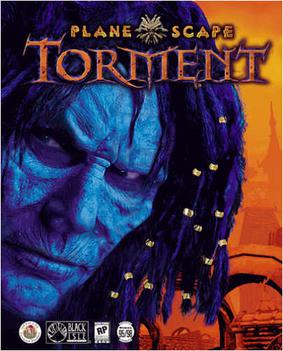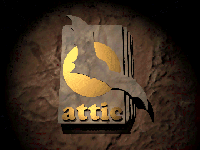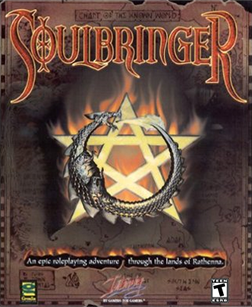
Planescape: Torment is a 1999 role-playing video game developed by Black Isle Studios and published by Interplay Entertainment for Windows. The game takes place in locations from the multiverse of Planescape, a Dungeons & Dragons (D&D) fantasy campaign setting. The game's engine is a modified version of the Infinity Engine, which was used for BioWare's Baldur's Gate, a previous D&D game set in the Forgotten Realms.
The Dark Eye is a German tabletop role-playing game with a high fantasy theme created by Ulrich Kiesow and launched by Schmidt Spiel & Freizeit GmbH and Droemer Knaur Verlag in 1984. It is the most successful role-playing game on the German market, outselling Dungeons & Dragons. Many years of work on the game have led to a detailed and extensively described game world.

Frank Brian Fargo is an American video game designer, producer, programmer and executive, and founder of Interplay Entertainment, inXile Entertainment and Robot Cache.

Black Isle Studios is a division of the developer and publisher Interplay Entertainment formed in 1996 that develops role-playing video games. It has published several games from other developers.

Chris Avellone is an American video game designer and comic book writer. He worked for Interplay and Obsidian Entertainment before becoming a freelance designer and writer. He is best known for his work on role-playing video games such as Planescape: Torment, Star Wars Knights of the Old Republic II: The Sith Lords and the Fallout series.

inXile Entertainment, Inc. is an American video game developer and a studio of Xbox Game Studios based in Tustin, California. Specializing in role-playing video games, inXile was founded in 2002 by Interplay co-founder Brian Fargo. The studio produced the fantasy games The Bard's Tale and Hunted: The Demon's Forge, along with various games for Flash and iOS such as Fantastic Contraption in its first decade of development. In 2014, inXile released the post-apocalyptic game Wasteland 2, following a successful Kickstarter campaign. Following the game's critical success, the studio went on to raise a then-record US$4 million on Kickstarter to develop Torment: Tides of Numenera, a spiritual successor to Interplay's Planescape: Torment. The studio was purchased by Microsoft and became part of Xbox Game Studios in 2018, just as they were developing Wasteland 3, which they released in 2020. The studio is currently developing Clockwork Revolution for Windows and Xbox Series X/S.

Realms of Arkania: Blade of Destiny is a role-playing video game developed by Attic Entertainment Software. It was the first game based on the German pen & paper RPG system The Dark Eye by Schmidt Spiele. The original German version of the game was released in 1992. Due to its success it was translated to English and released by Sir-Tech in 1993.

Realms of Arkania: Star Trail is a computer role-playing game by Attic Entertainment Software based on the German RPG system Das Schwarze Auge. The original German version of the game was released in 1994. Due to the success of its predecessor Realms of Arkania: Blade of Destiny, it was translated to English and released by Sir-Tech in the same year. An expansion, Speech Pack, was released in 1994 for the floppy disk version.

The Attic Entertainment Software GmbH was a German video game developer and publisher that was founded in September 1990 by Hans-Jürgen Brändle, Jochen Hamma and Guido Henkel in Albstadt, Baden-Württemberg. Attic has been inactive since 2001. The founder, Hans-Jürgen Brändle, was reported to have died in Las Vegas during the month of August, 2005.
Colin McComb is an American writer and game designer, who is best known for his work designing the Planescape setting for the Dungeons & Dragons role-playing game, and as the creative lead for the role-playing video game Torment: Tides of Numenera. He is the co-founder of 3lb Games, a virtual reality gaming studio.

Sigil is a fictional city and the center of the Planescape campaign setting, for the Dungeons & Dragons fantasy role-playing game.
Charles Deenen, is a Dutch video game audio director, composer, sound designer, and mixer. He wrote music created sound effects for many Commodore 64 and Amiga games, in addition to working for Interplay, Electronic Arts, and other video game developers.

Larian Studios is a Belgian independent video game developer and publisher founded in 1996 by Swen Vincke. Headquartered in Ghent, Belgium, Larian focuses on developing role-playing video games but has previously worked on educational games and casino games. It is best known for developing the Divinity series and Baldur's Gate 3.

Soulbringer is a fantasy RPG developed by Gremlin Interactive and published by Interplay Entertainment and Infogrames in 2000. It was later packed and shipped in combination with Interplay's Planescape: Torment.

Drakensang: The River of Time is a role-playing video game developed by Radon Labs. Drakensang TROT is the second video game in The Dark Eye-universe since Attic's Northlands Trilogy from the 1990s.
IdeaSpark Labs Inc. is a Canadian video game developer founded in 2009 by BioWare co-founder Trent Oster and former BioWare lead programmer Cameron Tofer. Beamdog's distribution service was launched in July 2010.

Torment: Tides of Numenera is a role-playing video game developed by inXile Entertainment and published by Techland Publishing for Microsoft Windows, macOS, Linux, PlayStation 4 and Xbox One. It is a spiritual successor to 1999's Planescape: Torment.












